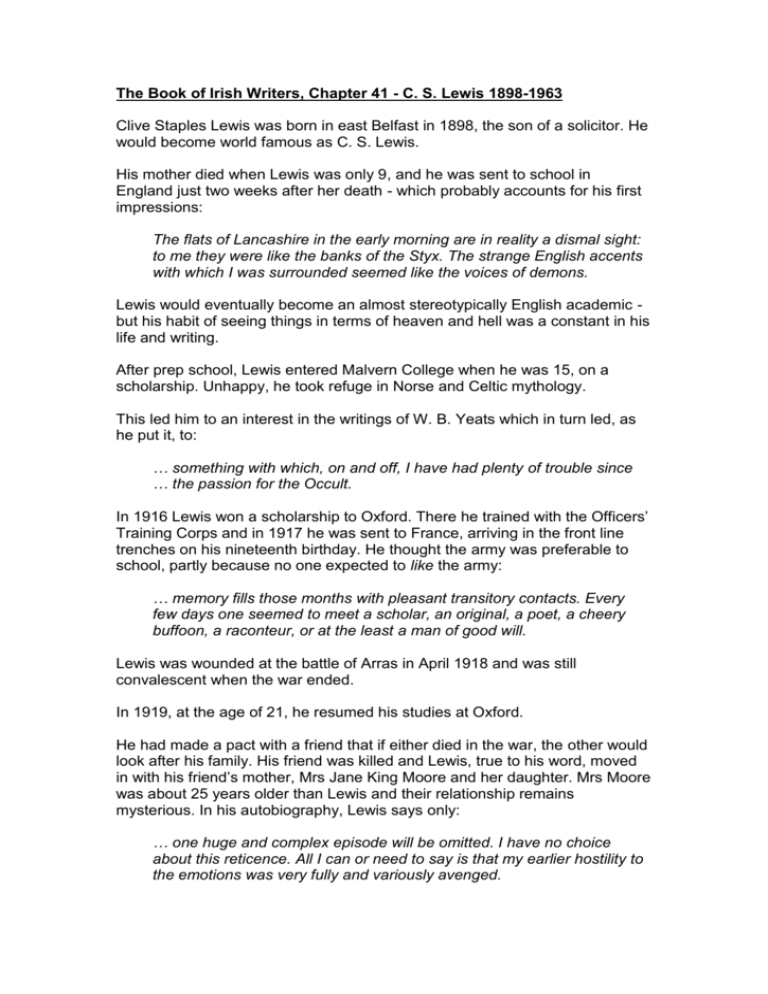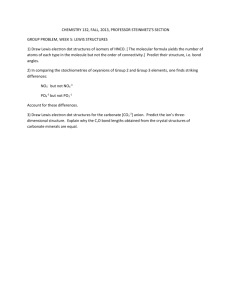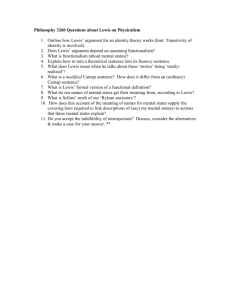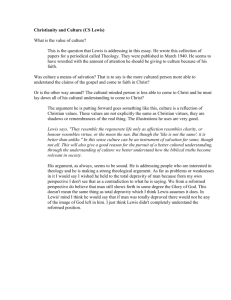Read the transcript of C.S. Lewis here
advertisement

The Book of Irish Writers, Chapter 41 - C. S. Lewis 1898-1963 Clive Staples Lewis was born in east Belfast in 1898, the son of a solicitor. He would become world famous as C. S. Lewis. His mother died when Lewis was only 9, and he was sent to school in England just two weeks after her death - which probably accounts for his first impressions: The flats of Lancashire in the early morning are in reality a dismal sight: to me they were like the banks of the Styx. The strange English accents with which I was surrounded seemed like the voices of demons. Lewis would eventually become an almost stereotypically English academic but his habit of seeing things in terms of heaven and hell was a constant in his life and writing. After prep school, Lewis entered Malvern College when he was 15, on a scholarship. Unhappy, he took refuge in Norse and Celtic mythology. This led him to an interest in the writings of W. B. Yeats which in turn led, as he put it, to: … something with which, on and off, I have had plenty of trouble since … the passion for the Occult. In 1916 Lewis won a scholarship to Oxford. There he trained with the Officers’ Training Corps and in 1917 he was sent to France, arriving in the front line trenches on his nineteenth birthday. He thought the army was preferable to school, partly because no one expected to like the army: … memory fills those months with pleasant transitory contacts. Every few days one seemed to meet a scholar, an original, a poet, a cheery buffoon, a raconteur, or at the least a man of good will. Lewis was wounded at the battle of Arras in April 1918 and was still convalescent when the war ended. In 1919, at the age of 21, he resumed his studies at Oxford. He had made a pact with a friend that if either died in the war, the other would look after his family. His friend was killed and Lewis, true to his word, moved in with his friend’s mother, Mrs Jane King Moore and her daughter. Mrs Moore was about 25 years older than Lewis and their relationship remains mysterious. In his autobiography, Lewis says only: … one huge and complex episode will be omitted. I have no choice about this reticence. All I can or need to say is that my earlier hostility to the emotions was very fully and variously avenged. They continued to share a house until Mrs King’s death in 1951. Lewis graduated with a triple first in 1923. In 1925 he was appointed to a post in English language and literature at Oxford which he would hold for the next thirty years. At this time he was agnostic, but under the influence of various friends, including J. R. R. Tolkien, he became a Christian in his early thirties. He would repay the debt by encouraging Tolkien to persevere and complete The Lord of the Rings. Lewis himself first acquired a name as a scholar of medieval and renaissance literature. He then went on to become more famous as a writer and broadcaster on Christian topics - and was an influence on the young Margaret Thatcher, though he may not have approved of this given his views on women: … the two things that some of us most dread for our own species [are] the dominance of the female and the dominance of the collective. By 1945 Lewis had completed a science fiction trilogy. Out of the Silent Planet; Perelandra; and That Hideous Strength. In these books space is inhabited by angels - and the other planets of the solar system are each ruled by an archangel. Earth is controlled by the devil. Lewis’s hearty male attitudes are clear. His hero Ransom, returning to earth after interplanetary adventures, wants only a pint of bitter in the pub. Lewis’s most famous work was yet to come. In the 1950s he published the seven volumes that make up The Chronicles of Narnia. These relate the adventures of a group of children in a land constructed from various mythologies. The books can be read as a Christian allegory with the talking lion Aslan standing in for Christ. By this stage Lewis had begun a correspondence with the American Joy Gresham. She moved to England in 1952 and in 1956 they married. She quickly became ill with cancer and despite a period of remission, she died in 1960. Lewis would record this in A Grief Observed in 1961, and their marriage would be the basis for the television drama and then film Shadowlands in 1993. Lewis himself died in 1963. His idea of heaven was he said: ‘Oxford lifted and placed in the middle of Co Down.’





